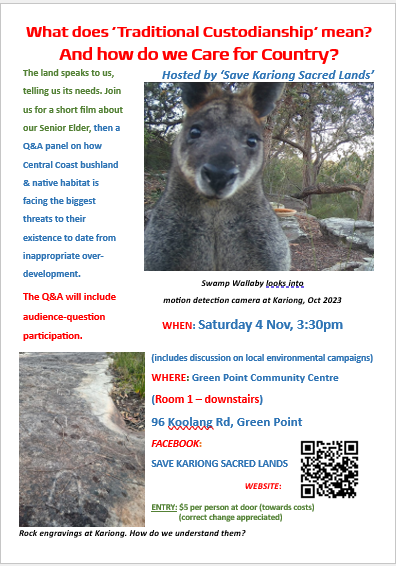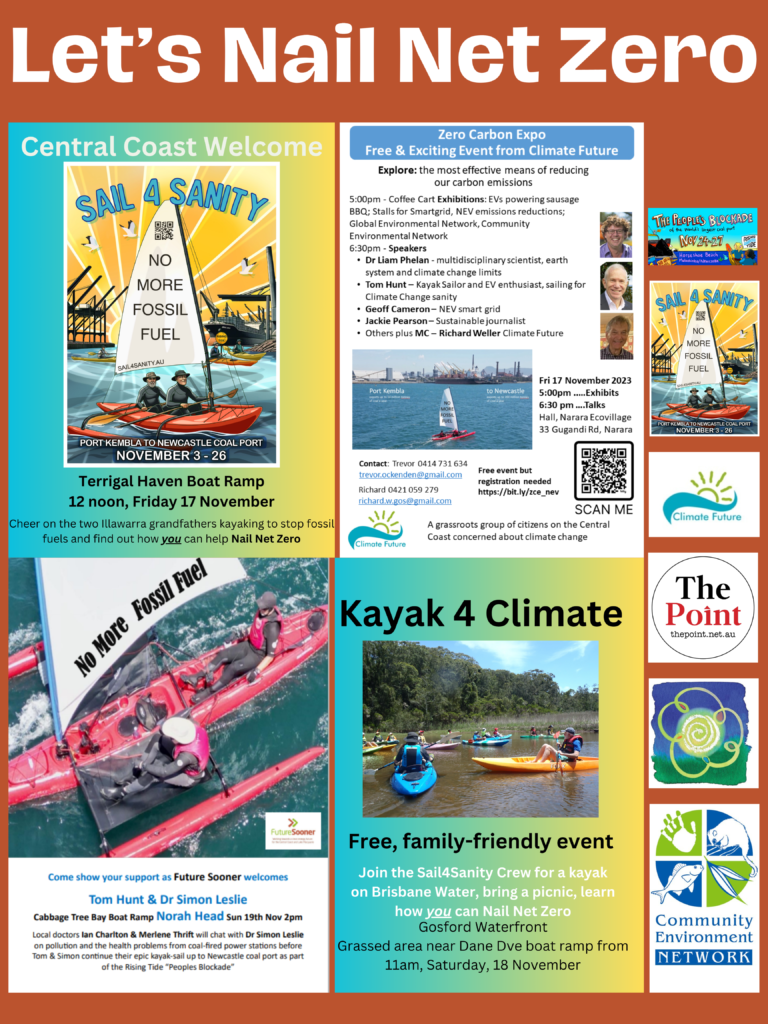OPINION: We are all custodians of Country – according to one Traditional Custodian – we all take from Mother Earth and are therefore obliged to protect her. A Q&A Panel meeting at Green Point Community Centre, on Saturday, 4 November, will examine how all residents can follow the example of First Nations people and care for country.

By Jacquelene Pearson
“It is all of our responsibility to nurture, respect and care for Country, for our own survival,” the Traditional Custodian says, when asked to explain what it means to be a “custodian”. “We do not own or have possession of Country. We are the guardians of it for future generations.”
This definition is an excellent starting point about what Caring for Country means in a practical and day-to-day sense, particularly in a region like the Central Coast, which is rich with First Nations Culture along with many communities of ecologically endangered flora and fauna.
On Saturday, November 4, the Save Kariong Sacred Lands group will hold a panel discussion about the practicalities of Caring for Country – implementing the principles that Custodians have adhered to for tens of thousands of years on the Central Coast. The venue is Green Point Community Hall from 3.30pm and the cost is $5 to cover room hire.
Here’s some more starting points for the discussion. I hope to see you there.
We live on stolen land. Sovereignty was never ceded. The western neo-colonial concept of land ownership and domination doesn’t sit well. The traditional owners of this Country, from the Hawkesbury River to Lake Macquarie, from the beaches to the hinterland, have left an astonishing legacy.
We literally have thousands of First Nations sites to respect and protect and learn from. We have stories and customs and lore that are older than any other continuous civilization. We ignore and trample over this legacy at our own peril.
It was the same year the First Fleet arrived that this area was “explored”. Arthur Phillip’s journals record entering Brisbane Water and finding numerous ‘fires’ along the shores and groups of people going about their daily lives. This area would have been richly populated prior to smallpox, frontier wars and mass dislocation. As it is now, it was a wonderful place to live prior to invasion – plenty of food from the air, land and ocean, a mild climate, awesomely beautiful, so many amazing places for dwellings, hunting, ceremony. Why wouldn’t you want to live here?
One of the earliest record keepers was the local magistrate, starting in the 1820s. They kept lists of court proceedings, of course, but also “blanket registers” – recording the names of individuals and groups who lived locally that were given blankets. According to those early records there were up to 12 groups of First Nations peoples who called this area home.
The greatest challenge, as modern residents wishing to learn about the history of this place, is that because it was so close to Farm Cove, many, many of the Traditional Owners fell prey to diseases such as small pox, massacres and simply being driven off their Traditional Country because of the pressure of colonization and imperialism.
As with all history, it is usually written and rewritten by the victors. When you start with an oral history, it is even more challenging to make sure you have the right version. Areas further away from the invasion site did not suffer the same levels of disease and dislocation. It has been easier for Traditional Custodians in those areas to retain their connection to country and the respect that rightfully comes with it.
There are very few Traditional Owners left in this area and we need to make sure they are able to continue to practice lore and culture and work with the rest of the community to keep their amazing legacy safe.
We need to focus on what the land tells us. If we look at Indigenous knowledge more broadly, at a global scale, we see that Indigenous peoples all over the planet have very similar approaches to caring for country. They don’t see themselves as the Apex Creature that nature is supposed to serve. They see themselves as custodians, caring for country. The rest of us need to learn that lesson, quickly, because at the moment we are imperiling our very own existence on this planet along with that of many other species.
What do we mean by Caring for Country?
John Seed is a deep ecology educator who now lives on the Central Coast. He has spent his life saving rainforests all over the world including the mighty Daintree in Queensland. He founded the Rainforest Information Centre at Dorigo.
He is not indigenous but he gives an excellent account of how modern humans are failing to care for the planet. He describes it as a “DIS EASE” – underlying all symptoms of the environmental crisis lay the illusion of separation of human beings from the rest of the natural world. We are living in times of “human centredness” where we are the Crowned Creation – the world consists of human beings and resources to serve human beings.
This ANTHROPOCENTERISM can be traced back to the Old Testament when we decided we had to subdue nature and it has completely corrupted the human soul.
John Seed thought he invented therapies to mend the tear between humans and the rest of the natural world. Then he visited and got to stay for extended periods of time with Traditional Custodians of South American rainforests and he found that the “therapies” he had been teaching were part of their ancient rituals. The elders of the rainforest assured him they had been performing these rituals without a break for tens of thousands of years.
It is only Indigenous cultures and a handful of non-indigenous people who truly understand that we are not the crowned species, that we are one tiny part of a delicate and complex web, called nature. If we do not embrace the opportunity to learn from Traditional Owners about how to truly be custodians of nature, if it is not already too late, then I believe we are facing sure catastrophe. Some examples of the crises that truly Caring for Country could address:
- Extinction crisis – an alliance of environmental and community groups between the Central Coast and Port Stephens formed the Barrington to Hawkesbury Climate Corridor Alliance in 2021. We mapped current and projected levels of land clearing from farming, logging, mining and development. We then overlayed that habitat loss with four different potential climate change scenarios to look at the likelihood of flora and fauna species extinctions in THIS REGION – Barrington to Hawkesbury by 2070. Flora – 74 threatened plant species were mapped in 2000 as having suitable habitat within the Barrington to Hawkesbury region. Of these 64 (86%) suffer significant range contractions by 2070, 38 (51%) will have no suitable habitat left ; 27 species (11 with recorded sightings since 2000) experience significant range contractions; 10 species (4 with recorded sightings since 2000) experience range expansions under a worst case climate scenario. FAUNA – 45% of NSW threatened species will have no suitable habitat left.
- Climate crisis – the Central Coast is extremely vulnerable to other impacts of the climate crisis in addition to species extinctions. Extreme weather events – east coast lows, coastal erosion, flooding and storm surge, catastrophic bushfire are all going to be future realities, especially if we end up with the worst case scenario which is for a hotter and drier climate.
- Livability crisis – if we continue on our current trajectory, standards of living are going to fall. From a global perspective, those who suffer the greatest impacts of the climate crisis are going to have to migrate to cooler regions. Clean and potable water shortages, food shortages, may become a reality. Rising ocean temperatures will change weather patterns and the availability of food. Only the extremely wealthy will be able to weather this storm. The remainder of us will be fending for ourselves. Arguably we already are.
- Culture crisis – ARE WE GOING TO BE RESPONSIBLE FOR THE DESECRATION AND DESTRUCTION OF THE WORLD’S OLDEST CONTINUING CULTURE – REALLY????????
How can we use the Traditional Custodians’ principles of Caring for Country to deal with these crises? Join the discussion at Green Point on Saturday, 4 November.


